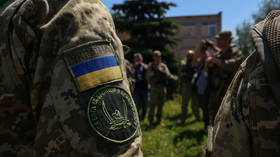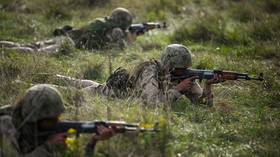Reasons for Ukraine’s counteroffensive setbacks explained by FT
Ukrainian troops consider Western training ineffective and too short, the Financial Times has said
The training of Ukrainian troops by the US and its allies in Europe did not properly prepare Kiev’s forces for what they faced during the summer counteroffensive against Moscow’s troops, the Financial Times reported on Friday, citing Western military analysts and Ukrainian soldiers.
So far, the Ukrainian military has “not achieved the desired decisive breakthrough,” FT reported, adding that some Western officials believe that Kiev has failed to use the opportunities offered by massive Western military aid at a time of “possibly peak political support.”
According to the paper, some US officials have privately complained that Ukrainian troops “failed during training to master modern operations that combine mechanized infantry, artillery and air defense.”
Ukraine’s losses early into the offensive were “unsustainable,” FT reported, adding that they amounted to “nearly a fifth of the NATO kit provided for the counteroffensive” in late May and early June alone. Such setbacks forced Kiev to change tactics and go back to an “attritional approach.”
The Ukrainian forces found it “impossible” to follow a NATO doctrine of combined arms warfare that involves coordinated actions by infantry, armor, artillery, and air defense, the paper said, adding that Kiev’s military still struggles to run operations “above the level of company (200 men) or even platoon (20-50).”
According to analysts interviewed by FT, the Western training of Ukrainian troops proved to be “too short” and was also poorly adapted to the real battle conditions the Ukrainian soldiers had to face while fighting Russians.
One Ukrainian Special Forces unit commander complained that if he had followed the “bad advice” he’d received from Western trainers, he would “be dead.”
“A poor understanding of how Ukraine’s military fights, and of the operating environment writ large, may be leading to false expectations, misplaced advice and unfair criticism in Western official circles,” military analysts Michael Kofman and Rob Lee said in a report on the issue published in early September.
US officials, in turn, have questioned Kiev’s decision to spend its more experienced troops on what they called a “futile defense” of the Donbass city of Bakhmut, which was captured by Russian forces in May 2023 following a months-long battle.
Russian forces, meanwhile, continue to “learn from their foes” and adapt their tactics, analysts said. In addition, Moscow’s forces still have the edge when it comes to drone warfare, as Russian Lancet-3 kamikaze drones are capable of autonomously tracking their targets and becoming a “particular menace” that Kiev can’t match.
Under the current circumstances, Ukraine’s success will be “slow-going at best” and it will continue to depend on Western allies “increasing production of ammunition and other equipment to sustain an attritional war.”







Comments are closed.